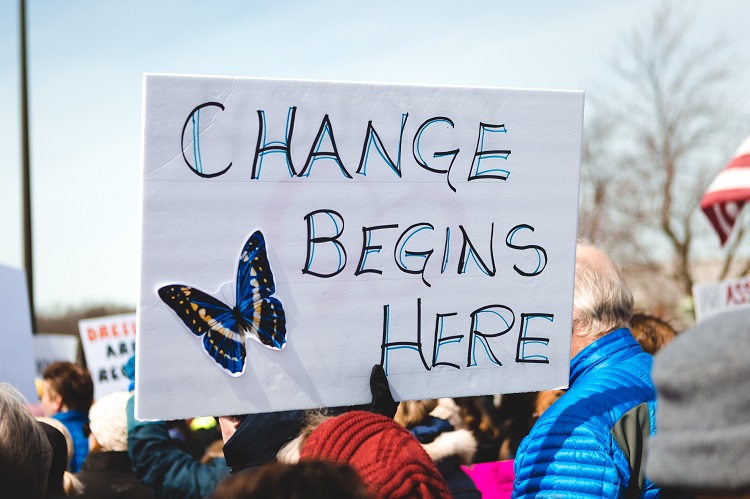In my previous blog post, I made the argument that a free market system relies on relationships of trust in order to coordinate the abilities of producers to serve the real needs and wants of consumers. However, there is a non-trivial sense in the American public today that even if free markets don’t depend on greed, there is still something wrong with our economic system. I believe one factor that contributes to this sentiment is the fact that social trust has been declining in America.
Recent findings from the Pew Research Center indicate that 75 percent of Americans believe that public trust in the federal government has declined. This is tangibly evidenced by the extent to which America’s political parties vilify their opponents and erode opportunities for respectful relationships to exist between different sides of the aisle. More broadly, in Yuval Levin’s new book, A Time to Build, he notes that the social crisis of this age stems from the lack of trust in structural institutions such as the government, businesses, churches, universities, and even families. The main concern is that with fewer connective, trust-building tissues often cultivated through these institutions, people will feel isolated from one another and have less of an opportunity to participate in collective action to achieve common goals.
But it doesn’t stop there, these trust issues also extend to interpersonal relationships. In a recent panel discussion hosted by the University of Dallas and Baylor’s Initiative on Faith, Ethics, and Public Policy, the scholars noted that interpersonal trust has been on a slow decline in part due to a preference for online communication. One scholar also referenced a trend among younger generations to trust those that align with their political and cultural opinions rather than those who fall in similar religious or ethnic circles. French political scientist, Alexis de Tocqueville, predicted this phenomenon of increased atomization of Americans in his famous exposition, Democracy in America. It is clear that this decline of social trust has perpetuated feelings of loneliness and disconnection, leaving many Americans cynical that any sense of trustworthiness can be restored under the current reality.
Along the same timeline as this decline, young people have increasingly advocated for fundamental changes to the foundational political and economic system in America. The proposed alternative, democratic socialism, has appealed to many voters evidenced by the success of the self-declared democratic-socialist presidential candidate, Bernie Sanders. Unlike laissez-faire systems, centralized systems like democratic socialism offers to replace human relationships with bureaucratic structures and government programs. In a time when Americans are less trusting of organic relationships and historical institutions, democratic socialism looks attractive because it promises a new sense of belonging and connection in a totally different type of society.
However, the type of society that emerges from a democratic-socialist system cannot achieve the standards or fulfill the promises that its proponents often promote. There is evidence that suggests individual and social responsibility, and by extension trust and moral agency, decline when people depend on the government to solve their social and economic problems. Under centralized systems, people tend to become more and more isolated, feeling “self-sufficient” but always subject to government-dependency. The extreme government intervention of democratic socialism could crowd-out the need for moral agency among people and perpetuate problems, such as disconnectedness, loneliness, and distrust within society.
Here is the important difference between these two systems: Free markets provide space for people to build trust among one another–democratic socialism does not. Yes, free markets depend on relationships of trust to work well, but free markets also create spaces for people to learn to trust one another meaningfully, organically, and in ways a democratic socialist system does not allow. This is not to say that all government intervention is an evil thing. I simply want to emphasize the real trade-offs our society faces when democratic socialism is suggested as an alternative to our current system.
However, the linchpin in this conversation is the assumption that social trust is indeed a good thing and essential to a just and humane society. If trust between people does not matter, then an argument could be made that the government must play a significant role to plan and order social and economic life. But, there is something distinctly human about the ability for humans to trust other humans. As Adam Smith wrote, “Nobody ever saw a dog make a fair and deliberate exchange of one bone for another with another dog.”
I’ll end with an example from the current state of affairs. The crisis of the spread of COVID-19 is tragic and has affected people from all walks of life. Many people have suffered with health complications, some have lost their jobs, small businesses are struggling financially due to closures, and many people live in fear and anxiety of the future. Federal and state governments are working hard to provide support and protection for their citizens, but we must admit that it is hard to actually trust these institutions to make good decisions about what is best for our livelihood. Instead, I know I can better trust my family, friends, neighbors, and larger community members to support each other in difficult times and actually be able to meet everyone’s needs. We must work to preserve the institutions that provide the opportunity to build-up social trust, because as a society, we need trust now more than ever.



